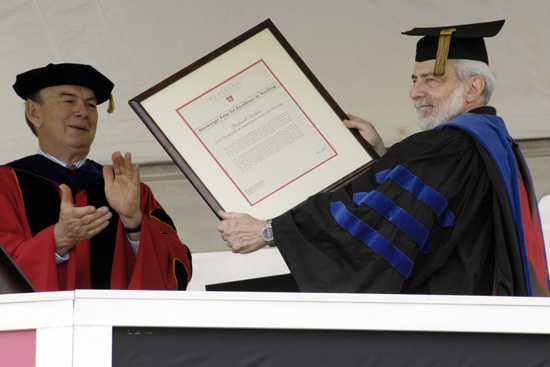3 Faculty Awarded for Excellence in Teaching
 |
| Richard Slotkin, the Olin Professor of American Studies and English, was one of three faculty members to receive the Binswanger Prize for Excellence in Teaching by President Doug Bennet during Commencement Ceremonies May 27. |
| Posted 06/04/07 |
| Joyce Jacobsen, the Andrews Professor of Economics; Richard Slotkin, the Olin Professor of American Studies and English; and T. David Westmoreland, associate professor of chemistry were the 2007 recipients of the Binswanger Prize for Excellence in Teaching. They received the prize during the 2007 Commencement ceremony May 27.
The Binswanger Prize for Excellence in Teaching was inaugurated in 1993 as an institutional recognition of outstanding faculty members. One to three Binswanger Prizes for Excellence in Teaching are presented each year and are made possible by the generosity of the Binswanger family that counts numerous Wesleyan alumni, alumnae and parents in its ranks. The standards and criteria for the annual prizes include excellence in teaching as exemplified by commitment to the classroom and student accomplishment, intellectual demands placed on students, lucidity, and passion. Recipients are chosen by a selection committee of emeriti, current faculty members and appointed members of the Alumni Association’s Executive Committee. Recommendations are solicited from members of the last ten graduating classes, the current junior and senior classes, and current graduate students. Recommendations are based on any of the types of teaching that are done at the University including, but not limited to: teaching in lecture courses, seminars, laboratories, creative and performance-based courses, research tutorials and other individual and group tutorials at the undergraduate and graduate level. Each recipient receives a citation and monetary prize made possible by the generosity of the Binswanger family. Previous recipients are excluded from consideration for seven years. The credentials of this years honorees are extensive. Briefly: Joyce Jacobsen joined the Wesleyan faculty in 1993. She received an A.B. in economics from Harvard University, a M.Sc. in economics from London School of Economics, and a Ph.D. in economics from Stanford University. Her main research interest is gender and racial/ethnic differences in employment and earnings patterns. Professor Jacobsen teaches courses on economics of gender, urban economics, econometrics, and microeconomic theory, and serves often as the CSS economics sophomore tutor. Her books include The Economics of Gender (2007), Labor Markets and Employment Relationships (with Professor Gil Skillman, 2004), and a forthcoming reader on Queer Economics, co-edited with Adam Zeller 00 (2007). She is the author of numerous book chapters and articles that have appeared in such publications as the Journal of Income Distribution, the European Economic Review, and the Quarterly Review of Economics and Finance. She is the editor of Eastern Economic Journal and the associate editor of Feminist Economics. Richard Slotkin joined the Wesleyan faculty in 1966. He developed the American Studies Program and chaired it for 20 years, and also has been a major contributor to the development of film studies at the University. This is Slotkin’s second time receiving the award. His latest book is Lost Battalions: The Great War and the Crisis of American Nationality (2005), the story of two World War I regiments: the African-American Harlem Hell Fighters and the Lost Battalion of the 77th Division, raised from the immigrant peoples of New Yorks tenements, who fought heroically for a country which refused to recognize them as equal citizens. He is best known for an award-winning trilogy of scholarly books on the myth of the frontier in American cultural history. Regeneration Through Violence: The Mythology of the American Frontier, 16001860 (1973) was a finalist for the 1974 National Book Award and received the 1973 Albert J. Beveridge Award of the American Historical Association. The second volume, The Fatal Environment: The Myth of the Frontier in the Age of Industrialization, 18001890 (1985) received the literary award of the Little Big Horn Associates, and has become a standard reference in the field of American studies. The final volume, Gunfighter Nation: The Myth of the Frontier in Twentieth-Century America (1992) was a finalist for the 1993 National Book Award. Slotkin also has written three historical novels: Abe: A Novel of the Young Lincoln (2000), which received the Michael Shaara Award for Civil War Fiction (2001) and the Salon.com Book Award (2000); The Return of Henry Starr (1988); and The Crater (1980). In 1995 he received the Mary C. Turpie Award from the American Studies Association, for his contributions to teaching and program-building. He also received Wesleyans Binswanger Prize for Excellence in Teaching in 1997. T. David Westmoreland received a B.S. degree from the Massachusetts Institute of Technology and a Ph.D. from University of North Carolina, Chapel Hill. Before joining the Wesleyan faculty in 1989, he held postdoctoral appointments at Stanford University and the University of California, Berkeley. His research interests are concentrated in the area of inorganic chemistry. He and his research group are particularly interested in the functions of metal ions in biological systems. His research publications have spanned a number of topics in this area, from the relationship between electronic structure and spectroscopic features of molybdenum-containing oxidoreductase enzymes, to new manganese and chromium-based contrast agents for magnetic resonance imaging (MRI). In addition, his work includes exploring fundamental aspects of atom transfer reactions that are related to biological and industrial oxidation processes. His work has appeared in The Journal of Inorganic Biochemistry, Inorganic Chemistry, and Organometallics. Professor Westmoreland teaches introductory general chemistry as well as advanced courses on inorganic chemistry and on chemical applications of symmetry concepts. He also has taught general education courses on pattern formation in nature and on scientific research ethics. He has been a research mentor to 24 Wesleyan undergraduates and six graduate students over the years. |
| Photo by Bill Burkhart, university photographer. |

